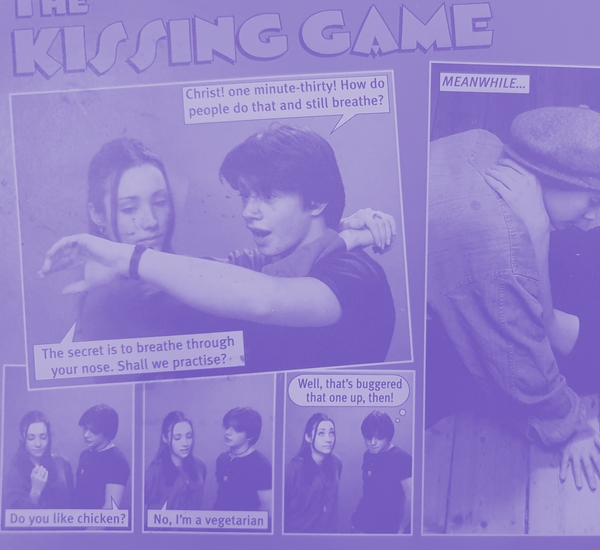The purpose of the Woolwich Young Radio Playwrights scheme was to offer a professional platform and outlet for young writers whose talent had not been discovered and developed by any other part of the dramatic industries- theatre, film, radio & television.
Within our limited resources we made the right decision to look at following up Dale Smith’s work and this was also true of the few other writers we were able to produce/commission for a second and third time.
He carried out his own extensive research into HIV/AIDs and produced an original script of very high quality. The advice he received from the professional dramatist Jez Simons in Leicester was excellent and supportive. It was a remarkable play. The concept of four characters: two pairs of teenage boys/girls performed by two actors taking on dual characterization was fascinating and captivating. It inspired the two professional actors cast, Danny Newman and Emma Owen-Smith, and they conducted considerable research and contributed great amounts of professional creativity to the interpretation.
When Dale says that the experience taught him the importance ‘of admitting to yourself when you don’t know enough about a subject […] I should have admitted that it wasn’t going to work, and either found out more or abandoned it altogether,’ I respect his reflection, but would disagree about the point as a conclusion for his experience. If there were problems with the script and the play received only ‘one scathing review, and did not do fantastically well,’ I think I, as the director should take my share of personal responsibility for that.
At the time he had also worked on an adaptation of Angela Carter’s ‘Wolfsong’; an excellent decision and I am sure he would have gained so much from dramatizating the writing of such a significant writer. But it is unlikely IRDP would have been able to afford the rights to produce a stage version.
I was very pleased with the production of ‘The Kissing Game.’ It had wit, humour, charm and, of course, it was a sincere issue play. I would have had no interest in whether Dale knew less about ‘lust and passion’ than ‘the risks of pregnancy and infection.’ If the play did not have authenticity, this would have been self-evident during the first rehearsed reading.
Dale had written another play for his generation, but unlike ‘Hello?’ its appeal and resonance did not move beyond the potential audience of 13 to 18. As another director who read the script quite sensibly observed, it was excellent and ideal for TIE ‘Theatre In Education’- a significant art and education movement originated by the Belgrave Theatre in Coventry in 1965.
‘The Kissing Game’ was a significant script and production that was all about getting young people involved in cutting-edge theatre and operating as an idealistic tool for social change. Why the hell not; even in those cynical and blasé 1990s?
Consequently the play’s four week run at the Tristan Bates in the heart of London’s West End, and probably one of the first to use filmic surround sound technology, was going to be judged by a 25 plus London fringe theatre culture. I remembered the substantial difference in audience electricity between those performances where there was a substantial proportion of under-eighteens and those with so-called sophisticated adult theatre expectations.
The problem IRDP had at the time was that the TIE infrastructure in Britain had been unraveling and where in London was there a TIE related theatre culture?
The experience informed me that Dale was indeed a flexible, resourceful and very professional writer. Yes he did write a new scene as a result of rehearsed readings and dramaturgy that was quite brilliant.
Did I need to press on Dale that as a professional writer he needed to draft and redraft if his instinct and cogent writer’s self-analysis told him to do so and that writing is hard, hard, very hard work? On reflection I probably did. But my omission would have been due to my reluctance to patronize him in any way. I have often been criticized for being too kind as a director.
What a shame we never worked together again. I would have been very happy to take on his next script and direct it. But I never believed at any point I was in danger of killing his talent by the kindness of letting go anything that did not merit production or a platform for professional dramatic expression.
I agree with his conclusion: ‘You might manage to write something good enough that people will ignore the rough edges for your first work, but your second has to be better. If you don’t do the hard work, you can’t improve. And there will always be someone better, more worthwhile, pushing up behind you.’ Tough love and words; certainly needed in the United Kingdom of the 21st century.
I desperately wanted to take on and develop the potential of the young and older new writers I worked with during the Woolwich Young Radio Playwrights’ competition and IRDP’s other schemes such as the London Radio Playwrights’ Festival. I even applied for the post of Editor of BBC Radio Drama in 1997 and succeeded in reaching a short-list of two before an interviewing panel that included the BBC’s Creative Director Alan Yentob. I was runner up to Kate Rowland.
Not being able to find an outlet and infrastructure to assist in the development of those writers is one of the biggest disappointments of my life, but I am so glad to say I do not regret for one moment the honour and privilege of working with writers such as Dale. All of the writers and scripts we recognised, commissioned and produced when we were able to raise the budgets, deserved the recognition and attention they received. The writing was cutting edge, unusual in attitude and representational voice, authentic, interesting, and valid and not being given a platform anywhere else.
Tim Crook
